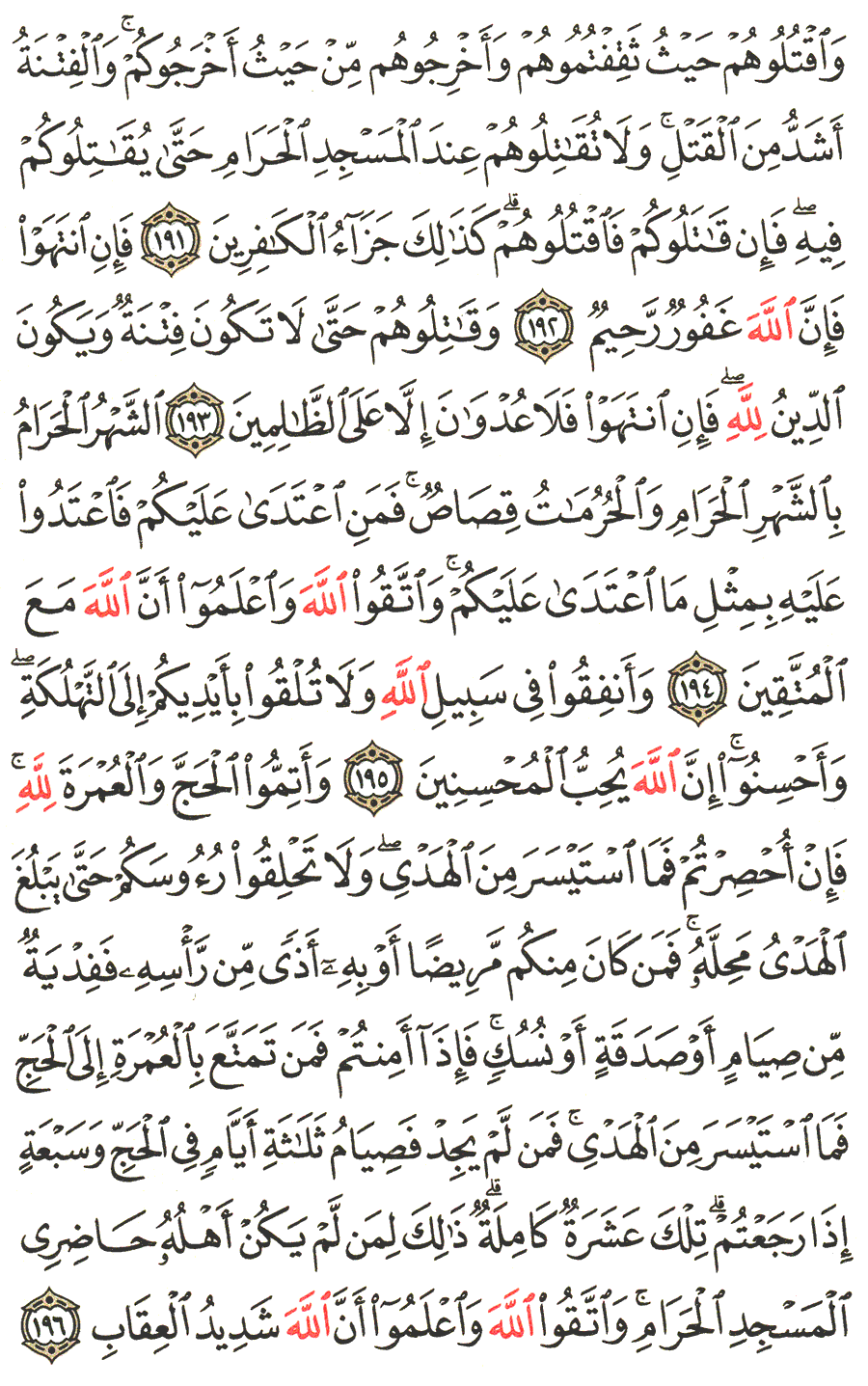Surah Al-Baqarah - سورة البقرة | reading sorat bakara Written in Arabic language with translating meanings English & from the moshaf in arabic uthmani
| Listen mp3 | Tafsir Arabic | tafsir mokhtasar |
| English | Indonesian | French |
| German | Hausa | Spanish |

English translation of the meaning Page No 30
Sura Al-Baqarah from 191 to 196
191. And kill them wherever you find them, and turn them out from where they have turned you out. And Al- Fitnah [ 1 ] is worse than killing. And fight not with them at Al- Masjid- Al- Harâm ( the sanctuary at Makkah ) , [ 2 ] unless they ( first ) fight you there. But if they attack you, then kill them. Such is the recompense of the disbelievers.
192. But if they cease, then Allâh is Oft- Forgiving, Most Merciful.
193. And fight them until there is no more Fitnah ( disbelief and worshipping of others along with Allâh ) and ( all and every kind of ) worship is for Allâh ( Alone ) . [ 3 ] But if they cease, let there be no transgression except against Az- Zâlimûn ( the polytheists, and wrong- doers )
194. The sacred month is for the sacred month, and for the prohibited things, there is the Law of Equality ( Qisâs ) . Then whoever transgresses the prohibition against you, you transgress likewise against him. And fear Allâh, and know that Allâh is with Al- Muttaqûn ( the pious - See V.2:2 ) .
195. And spend in the Cause of Allâh ( i.e. Jihâd of all kinds ) and do not throw yourselves into destruction ( by not spending your wealth in the Cause of Allâh ) , and do good. Truly, Allâh loves Al- Muhsinûn [ 4 ] ( the good- doers ) .
196. And perform properly ( i.e. all the ceremonies according to the ways of Prophet Muhammad ( saas ) ) , the Hajj and ‘Umrah ( i.e. the pilgrimage to Makkah ) for Allâh. But if you are prevented ( from completing them ) , sacrifice a Hady ( animal, i.e. a sheep, a cow, or a camel ) such as you can afford, and do not shave your heads until the Hady reaches the place of sacrifice. And whosoever of you is ill or has an ailment in his scalp ( necessitating shaving ) , he must pay a Fidyah ( ransom ) of either observing Saum ( fasts ) ( three days ) or giving Sadaqah ( charity - feeding six poor persons ) or offering sacrifice ( one sheep ) . Then if you are in safety and whosoever performs the ‘Umrah in the months of Hajj before ( performing ) the Hajj, ( i.e. Hajj- at- Tamattu‘ and Al- Qirân ) , he must slaughter a Hady such as he can afford, but if he cannot afford it, he should observe Saum ( fasts ) three days during the Hajj and seven days after his return ( to his home ) , making ten days in all. This is for him whose family is not present at Al- Masjid- Al- Harâm ( i.e. non- resident of Makkah ) . And fear Allâh much and know that Allâh is Severe in punishment. [ 5 ]
[1] (V.2:191) Al-Fitnah: polytheism, to disbelieve after one has believed in Allâh, or a trial or a calamity or an affliction.
[2] (V.2:191) Narrated Abu-Bakrah (raa): The Prophet (saas) delivered to us a Khutbah (religious talk) on the day of Nahr (10th of Dhul Hijjah ). He said, "Do you know what is the day today?" We said, "Allâh and His Messenger know better." He remained silent till we thought that he might give that day another name. He said, "Isn’t it the day of Nahr ?" We said, "It is." He further asked, "Which month is this?" We said, "Allâh and His Messenger know better." He remained silent till we thought that he might give it another name. He then said, "Isn’t it the month of Dhul-Hijjah ?" We replied: "Yes, it is." He further asked, "What town is this?" We replied, "Allâh and His Messenger know it better." He remained silent till we thought that he might give it another name. He then said, "Isn’t it the forbidden (sacred) town (of Makkah)?" We said, "Yes, it is." He said, "No doubt, your blood and your properties are sacred to one another like the sanctity of this day of yours, in this month of yours, in this town of yours, till the day you meet your Lord. No doubt! Haven’t I conveyed Allâh’s Message to you? We said, "Yes." He said, "O Allâh! Be witness. So it is in incumbent upon those who are present to convey it (this information) to those who are absent because the informed one might comprehend it (what I have said) better than the present audience, who will convey it to him. Beware! Do not renegade (as) disbelievers after me by striking the necks (cutting the throats) of one another." (Sahih Al-Bukhâri, Vol.2, Hadîth No.797).
[3] (A) (V.2:193) Narrated Ibn ‘Umar (raa): Allâh’s Messenger (saas) said, "I have been ordered (by Allâh) to fight against the people till they testify that Lâ ilâha illallâh wa Anna Muhammad-ur-Rasûl Allâh (none has the right to be worshipped but Allâh (Lord Almighty and Exalted) and that Muhammad (saas) is the Messenger of Allâh), and perform As-Salât (Iqâmat-as-Salât) and give Zakât , so if they perform all that, then they save their lives, and properties from me except for Islâmic laws, and their reckoning (accounts) will be with (done by) Allâh." (Sahih Al-Bukhâri, Vol.1, Hadîth No.24).
( B ) See ( V.8:39 ) and its footnote.
[4] (V.2:195) See (V.2:112)
[5] (V.2:196) Islâm demolishes all the previous evil deeds and so does migration (for Allâh’s sake) and Hajj (pilgrimage to Makkah). [Al-Lu’lu’ wal Marjân , Vol.1, Ch.52, P.205]. The obligation of performing ‘Umrah and its superiority. Ibn ‘Umar (raa) said, Hajj and ‘Umrah are obligatory for everybody." And Ibn ‘Abbâs (raa) said, ‘Umrah is mentioned in conjunction with Hajj in the Book of Allâh (Lord Almighty and Exalted): "And perform properly Hajj and ‘Umrah for Allâh." (2:196).
Narrated Abu Hurairah ( raa ) : Allâh’s Messenger ( saas ) said, « ( The performance of ) ‘Umrah is an expiation for the sins committed ( between it and the previous one ) . And the reward of Hajj Mabrûr ( the one accepted by Allâh ) is nothing except Paradise. » ( Sahih Al- Bukhâri, Vol.3, Hadîth No.1 ) .










Page No 30 Download and Listen mp3